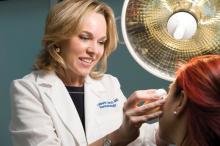Medical and cosmetic dermatologists may bring different views to the discussion of skin care, but they do agree on one thing – health should always come before beauty.
Basic dermatologic health procedures, like total body skin checks, mole assessment, and sun exposure advice, should be the foundation of any cosmetic dermatologist's work. No amount of wrinkle reduction, laser resurfacing, or complexion correction can ever make up for a missed skin cancer, according to cosmetic dermatologists.
"I take this responsibility very seriously," said Dr. Elizabeth Tanzi, a Washington, D.C. dermatologist who specializes in laser surgery. "All our patients, whether new or returning, get a full head-to-toe exam for skin cancer. It would be tragic to be talking about wrinkles and crepey skin when there’s a skin cancer."
Dr. Tanzi said that health should be center of any dermatologic procedure – and that cosmetic procedures are no exception.
"We have to look at it like this: Number one, make sure your skin is healthy. Number two: beautify it."
Dermatologic practices are split into three categories: all cosmetic, all medical, or a combination of the two. Purely medical dermatologists tend to cluster in academic institutions, while purely cosmetic dermatologists are most often seen in large cities. Dual-therapy dermatologists are the workhorses who serve most communities.
All dermatologists need to know when to proceed and when to say "no," Dr. Tanzi said. Referral to a medical dermatologist may cost a patient in the short term, but will serve everyone well in the long term.
"If a patient comes to me with an issue in my area of expertise and I know I can do a great job, I’ll take it," said Dr. Tanzi, codirector of the Washington Institute of Dermatologic Laser Surgery. "If they come in with something where I’m not up on the latest, or something I haven't seen in years and feel I won’t be best for the job, I refer. An urban setting really allows this to happen. In D.C. we have the luxury of saying that there is someone nearby who is an expert in any field. It is a different story in communities where you need to be a jack of all trades."
A Jack of All Trades
Dr. Margaret "Peggy" Fitch fills that bill. "I’m a surgical and cosmetic dermatologist in the morning and a medical dermatologist in the afternoon," said Dr. Fitch, founder of Aiken Dermatology, Aiken, S.C.
She didn't always split her time between the disciplines, however. When she began practicing 30 years ago, she focused on medical and surgical dermatology. Then things began to change.
"Over time, peels, fillers, Botox, and sclerotherapy came along. They were on the front page of Cosmopolitan. Patients were asking about them. And I was seeing the results of bad outcomes – procedures done by physicians who shouldn’t have been doing them."
Taking a weekend course in a cosmetic procedure does not make an expert, Dr. Fitch said.
"Let’s be honest – there are lots of doctors out there who do this just to make a quick buck, and I was seeing the results of that. So I thought, 'I'm a dermatologist. I know skin and the anatomic structure of the face. I should be doing this.' So gradually I learned and added to my practice."
She doesn't shy away from discussing the financial benefits of cosmetic work.
"Sure, it's a revenue builder. But I let patients decide what they want. If someone comes to me for a medical issue, I will never, ever bring up a cosmetic issue. I think that is foraging in the forest for a buck. If a patient asks about Botox while we're talking, that's another issue. But as a doctor, I would never bring up someone’s wrinkles."
She isn’t afraid to say "no" either. "I say no all the time. I’m not above saying, 'Look you don’t need this.' "
For example, she said, a 27-year-old bride-to-be asked her for filler for her lips. Dr. Fitch refused, telling her the lines were too fine to be treated, and that she was too young to be looking at the procedure. "I could have made $500 for that. But I think I'm the exception to the rule here. Most people would have gone and done it."
As a surgical dermatologist, she concentrates on skin cancers, using her own in-office pathology lab to assess the specimens. "I do flaps and grafts, but I would never attempt a full Mohs. That’s all part of knowing when you must say to a patient, 'I'm a good doctor and a good surgeon, but I'm not the best person for this.' "


